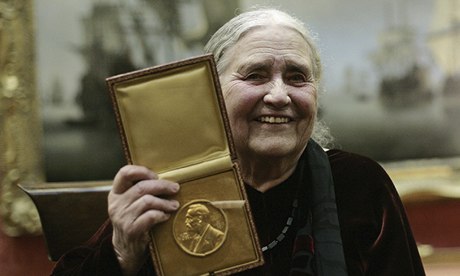
The novelist Doris Lessing, who tackled race, ideology, gender politics and the workings of the psyche in a prolific and often iconoclastic career, died in London on Sunday at the age of 94, her publisher HarperCollins said.
REPORT BY REUTERS/ONLINE REPORTER
Lessing had written over 50 novels ranging from political to science fiction.
The British-Indian novelist Salman Rushdie hailed the “warmth, sharp mind and ferocity” of a writer who continually reinvented herself to challenge conventions, but defied the feminists and leftists who would have claimed her for their cause.
Below is a timeline of her life: 22 October 1919: Born Doris Lee Tayler in Kermanshah Iran. Both of her parents were British: her father, who had been crippled in World War I, was a clerk in the Imperial Bank of Persia; her mother had been a nurse.

Lessing has described her childhood as an uneven mix of some pleasure and much pain.
1925: Her family moved to Zimbabwe (then Southern Rhodesia) to farm maize near Banket which proved unsuccessful. She was educated at the Dominican Convent until she dropped out at the age of 14 and was self educated thereafter.
1937: Lessing moved to Harare to work as a telephone operator, marrying her first husband, Frank Wisdom, with whom she had two children (John and Jean), before the marriage ended in 1943.
- Chamisa under fire over US$120K donation
- Mavhunga puts DeMbare into Chibuku quarterfinals
- Pension funds bet on Cabora Bassa oilfields
- Councils defy govt fire tender directive
Keep Reading
1943: She met Gottfried Lessing, a man who would later become her second husband, at a communist book club that she had joined years before. They divorced in 1949 and she never married again.
1949: Because of her campaigning against nuclear arms and apartheid, Lessing was banned from South Africa and Zimbabwe for many years.
Lessing left for London with the manuscript of her first novel The Grass Is Singing in her suitcase leaving two toddlers with their father in South Africa (another, Peter, from her second marriage, went with her). On leaving her toddlers: “For a long time I felt I had done a very brave thing. There is nothing more boring for an intelligent woman than to spend endless amounts of time with small children. I felt I wasn’t the best person to bring them up. I would have ended up an alcoholic or a frustrated intellectual like my mother.”
1950: The Grass is Singing, her first novel, is published. The novel created a sensation when it was published and is still a notable reference point of the racial politics of blacks and whites in colonial Southern Rhodesia (Zimbabwe).
1962: Breakthrough work with The Golden Book. It explores mental and societal breakdown with anti-war and anti-Stalinist themes. It has been translated into a number of other languages, including but not limited to Spanish, Japanese, and Shona.

In 2005, the novel was chosen by TIME magazine as one of the 100 best English-language novels since 1923.
1982: Lessing tired to publish two books under her pen name, Jane Somers, to show the difficulty that new writers faced in trying to get their works in print. The novels were declined by Lessing’s UK publisher, but was later accepted by another English publisher.
1999: Lessing declined a damehood, but accepted appointment as a Companion of Honour for “conspicuous national service”. She was also made a Companion of Literature by the Royal Society of Literature.
2001: Lessing was awarded the David Cohen Prize for a lifetime’s achievement in British literature.
2007: Awarded Nobel Peace Prize in Literature. Lessing was the eleventh woman and the oldest person ever to receive the Nobel Prize in Literature. She was out shopping for groceries when the announcement came, arriving home to tell reporters who had gathered there, “Oh Christ!” She told reporters outside her home, “I’ve won all the prizes in Europe, every bloody one, so I’m delighted to win them all. It’s a royal flush.”
Watch Doris Lessing react to the news of her award below:


2008: The Times ranked her fifth on a list of 50 Greatest writers since 1945. In the same year her last novel, Alfred & Emily, was published. The book is based on the lives of Lessing’s parents.












